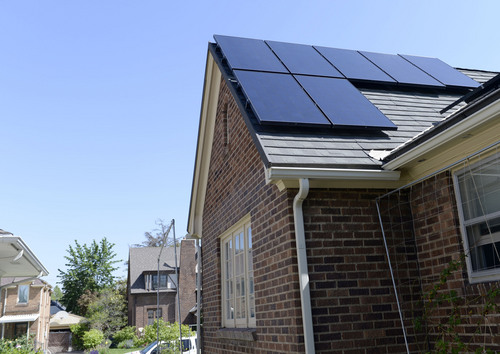This is an archived article that was published on sltrib.com in 2014, and information in the article may be outdated. It is provided only for personal research purposes and may not be reprinted.
A growing chorus from across the sociopolitical spectrum is denouncing Rocky Mountain Power's proposal to impose a monthly $4.65 fee on its net-metered customers — those who generate their own power from solar rooftop arrays and pipe what they don't use into the grid.
The state's largest utility says the "facilities charge" is warranted to ensure its solar-equipped customers are covering their share of the fixed costs of the transmission and distribution system.
Critics, who gathered at an east Salt Lake City synagogue Wednesday, said the fee would discourage personal investment in a renewable power source that is needed to wean Utah from coal — which accounts for two-thirds of RMP's power generation.
"Utah is blessed with abundant solar resources to help reduce our long-standing dependence on dirty fossil fuels," Rabbi Ilana Schwartzman told reporters and others outside her place of worship, which has dozens of solar panels on its roof.
The rabbi of Congregation Kol Ami, Utah's largest Jewish congregation, Schwartzman was among representatives of faith organizations, businesses and local governments calling on the Utah Public Service Commission (PSC) to reject the proposal to charge net-metered customers an additional $56 per year.
The commission will hear testimony Monday on the proposal, which has garnered the attention of clean-energy activists from across the country — even though the fee would raise only about $150,000 in its first year.
"It could be the horse out of the barn. Once enacted it could go up," said Mark Walton of Creative Energies, a Salt Lake City firm that designs and installs photovoltaic systems.
As a regulated monopoly, however, RMP is obligated to ensure customers who incur costs to the system pay for those costs, company officials say. Net-metered customers evade those costs because they substantially lower their utility bills by producing much of their own power, according to utility spokesman Dave Eskelsen.
"The main issue is one of fairness for all residential customers," Eskelsen said. "Customers who don't use this technology are subsidizing those that do and that's not fair. They simply don't understand the rate-making mechanics that make this rate structure change necessary."
Critics of the proposal say RMP ignores the extensive benefits net-metered customers provide the utility and its grid by helping it avoid costs associated with peak-load power generation and wear and tear on the transmission equipment. Rep. Patrice Arent, D-Millcreek, said a bill enacted last session requires the PSC to consider costs and benefits solar-powered customers bring to the grid before setting a fee.
Eskelsen contends fee critics overstate those benefits because peak solar production does not coincide with peak demand.
Regardless of net metering's effects on RMP's bottom line, the utility's critics say society and the environment will reap huge benefits as more homeowners install solar arrays. This monopoly company, they say, should not get in the way of progress toward cleaner air and reduced carbon emissions, linked to climate change.
Continuing to rely on coal is a breach of our "fiduciary duty" to take care of national resources for future generations, said Mark Thomas, representing the Mormon Environmental Stewardship Alliance, or MESA. The alliance includes concerned members of The Church of Jesus Christ of Latter-day Saints, but it does not represent the Utah-based faith.
"It's a social-justice issue," said Pastor Jean Schwien of Salt Lake City's Christ United Methodist Church. "We are essentially punishing people who do the right thing to switch from fossil fuels to renewable energy."



